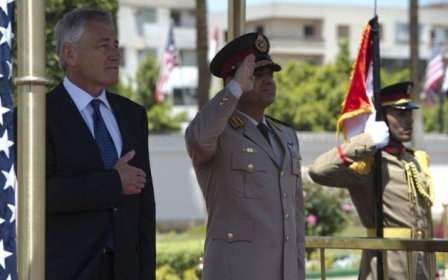Muslim Brotherhood: Rejection risks ICC's credibility

A legal team acting on behalf of the Muslim Brotherhood announced on Friday that it will appeal the International Criminal Court's decision to reject a complaint lodged by the organisation against Egypt's military regime.
The case, filed on behalf of former president Mohamed Morsi, alleged that the military regime was responsible for the deaths of over 2,000 protesters and the arrest of over 20,000 Egyptians. It also alleges that the regime was responsible for international crimes against humanity including murder, forced disappearance and torture.
The ICC had said on Thursday that the allegations were “dismissed as [they were] not presented on behalf of the concerned state". Bensouda added that the ICC had asked Egypt's military-backed government whether the complaint had been transmitted “on behalf of the state of Egypt”. When it received a negative reply, the ICC concluded that the complaint could not be pursued.
In a statement to MEE, Secretary General of the International Organisation of the Muslim Brotherhood Ibrahim Munir said, “The ICC’s rejection of the complaint by saying that it is not on behalf of the Egyptian government, tells the world that that it recognises the coup and military-backed government.”
“The ICC refusal of the case due to procedural and technical issues, gives credence and international recognition to a dangerous principle. It will create a complete lack of trust in international law and international institutions” added Munir.
Stay informed with MEE's newsletters
Sign up to get the latest alerts, insights and analysis, starting with Turkey Unpacked
“Furthermore, it sends out a message that justice is selective to extremists and that there is no international justice. This can only increase violence across the world,” he said.
The ICC has clarified that it rejected the complaints on the formal grounds that Morsi was not in power at the time of the alleged crimes, and thus did not represent the state of Egypt for the purposes of the application.
Furthermore, the ICC stated in the communication issued on 1 May that since the court’s jurisdiction is in accordance with the Rome Statute, it can only prosecute non-states parties in this case if the Egyptian “state voluntarily accepts the jurisdiction of the ICC or if the UNSC [United Nations Security Council] refers the situation to the ICC Prosecutor.”
The Muslim Brotherhood has refused to accept the reject, calling for help from the rest of the world.
"This is an issue that the international community and the UN must get involved in immediately to maintain their credibility, ensure peace and uphold international human rights treaties,” said Munir.
In further signs of the developing political conflict between the Muslim Brotherhood and Cairo's leadership, the interim Egyptian government on Thursday called on its British counterpart to freeze funds of the Muslim Brotherhood and hand them over to Egypt.
“Egypt’s Justice Minister Neir Osman met with UK ambassador James Watt last Sunday and asked him to talk to London to freeze the Brotherhood’s assets in the UK, which Cairo estimates to be at billions [of dollars], and return them to Egypt,” Assistant Minister of Justice for International Cooperation Adel Fahmi told Anadolu Agency.
In response to the call, Munir said, “It is odd of the interim government to make this request. There has not been a call for the freezing of the [Hosni] Mubarak regime members’ funds until today. They [interim government] will not be able to provide any evidence for their call.”
Middle East Eye delivers independent and unrivalled coverage and analysis of the Middle East, North Africa and beyond. To learn more about republishing this content and the associated fees, please fill out this form. More about MEE can be found here.



